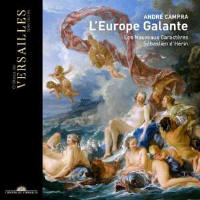Texte paru dans: / Appeared in: |
|
|
Outil de traduction (Très approximatif) |
|
|
Reviewer:
David Vickers
Incredibly, this is the first complete recording of Campra’s innovative opéra-ballet
L’Europe galante (1697); La Petite Bande and Gustav Leonhardt recorded
only extracts in 1973. It is one of several flagship releases launching the new
label of Château de Versailles, where Les Nouveaux Caractères’ spirited
performance was recorded. Sébastien d’Hérin directs with optimal attention to
effervescent small details, occasionally at the expense of broader brush-strokes
– from time to time the quick-paced momentum of the musicmaking could afford to
relax in the service of gentler gracefulness. The vividness of the orchestral
playing guarantees manifold colours and moods, although there are a few numbers
in which the trigger-happy percussionist might have valued discretion as the
better part of valour (a Canaries dance towards the end of the prologue sounds
like a pantomime donkey has clattered on to the stage).
In
the prologue, Discord bickers superciliously with the offended Venus’s
insistence that love is to be found all over the nations of Europe. The first
entrée (France) is a pastoral depiction of the transient amorous loyalties of
fickle shepherds – Nicolas Courjal’s ardent Silvandre arranges a divertissement
to entertain the immune Céphise, whose dulcet beauty is given instant credence
by Heather Newhouse’s silken singing of her entrance air (bewailing that she is
heartily fed up with all the attention she gets every few days from different
men). It transpires that only two days earlier Silvandre had sworn undying love
to Doris – who concludes the entrée with a heartbroken soliloquy sung touchingly
by Isabelle Druet. The second entrée is a pair of quixotic Spaniards singing
their nighttime serenades under the balconies of their respective mistresses;
Dom Pedro’s sensual sommeil is sung mellifluously by Anders Dahlin,
accompanied by melancholic strings and soft flutes (this chaconne alone is worth
the price of admission), whereas under a nearby balcony Dom Carlos (not that
one) sings an impassioned love song of a broodier character. It is unsurprising
that castanets make a noisy appearance in the Spanish dances – clearly the whole
street is going to be awoken – but a little Spanish song sung ‘by a lady
musician’ is delivered by Caroline Mutel with impeccable translucence. The third entrée is a Venetian masked ball: Olimpia rebuffs the jealous Octavio, who pretends to murder his rival but is then despondent upon witnessing her grief. Assorted little airs with chorus refrains and chaconnes for the masqueraders feature excellent contributions from the woodwinds. The last entrée is set in a Turkish seraglio; the slave Zäide (not that one) and Roxane compete for the attention of the sultan Zuliman; after Roxane attempts to stab her rival, the sultan opts decisively for Zäide (whose opening soliloquy professing her unrequited love is sung eloquently by Druet). The celebration of the triumph of love culminates in a lively succession of songs, choruses and dances for the Ottoman imperial guards, including a janissary band of percussion that is performed spicily. Having been an obvious lacuna in the discography for so long, this is essential listening for all admirers of French Baroque opera. |
|




